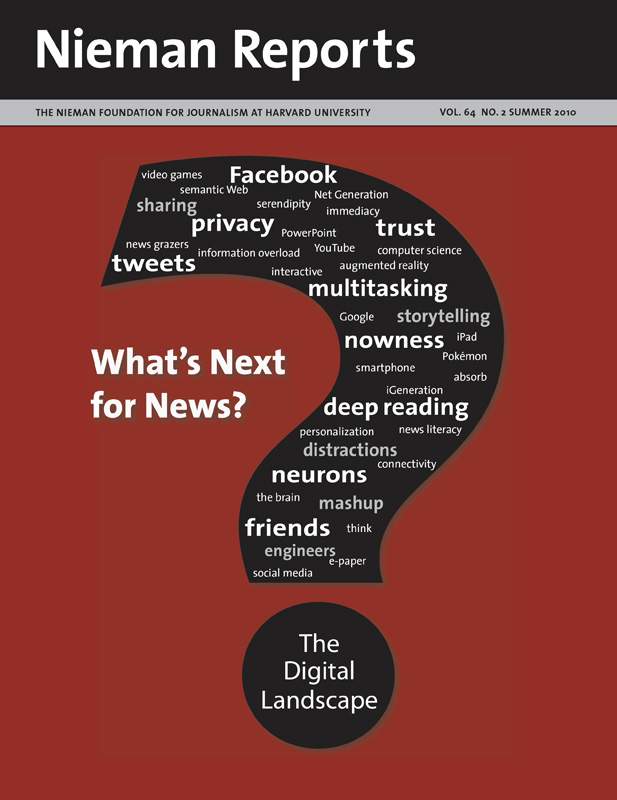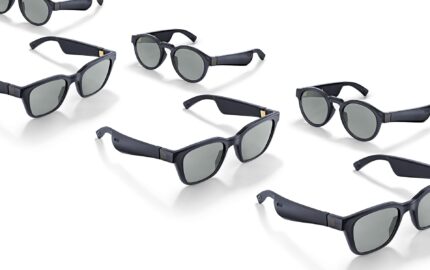RELATED ARTICLES
"Journalism: English for the 21st Century"
- Esther Wojcicki
"E-Textbooks to iPads: Do Teenagers Use Them?"
- Esther WojcickiEsther Wojcicki’s ninth-grade students at Palo Alto High School, most of whom are 14 years old, wrote essays about “The Future of Reading,” a Fortune magazine article by Josh Quittner that they read and discussed in class. Complete texts are available at the links below:
Ana Carano
New controversy has arisen on how publications will fare in the modern age. With the rise of the Internet, everything and anything can be read online for free, and it is uncertain whether the physical, written word will still be relevant or even exist in the future. The future of reading will differ for news stories, magazines and books. Read the full essay »
Aaron Chum
The future of news will be online. Newspapers will slowly begin to put more resources into online media and spend less time designing layouts for their paper newspapers. Most people read the news to get a better sense of what is happening around them. They don’t read it for an in-depth analysis of topics. Therefore, a quick scan of a short article is normally all that people desire. Read the full essay »
Diana Connolly
Adapt. This is the power behind the human brain. Humans have natural instincts to adapt to their surroundings. Their temptation to always receive more and more causes humans to create new and useful ways to benefit themselves. Literature has survived many centuries, from as long ago as the time of the Egyptians, but will the new technology change literature as we know it? Read the full essay »
Emily Rosenthal
With the new Apple iPad and other tablets to follow, there’s been much debate over the future of printed media. Some people believe that printed books and magazines are dead, while others believe this is just a phase in our culture. Though there are strong arguments for each side, the outcome really depends on the type of media combined with the technology available, and isn’t as clear-cut as just black or white. The future of reading is varied and depends mostly on the type of work it is. Read the full essay »
"Journalism: English for the 21st Century"
- Esther Wojcicki
"E-Textbooks to iPads: Do Teenagers Use Them?"
- Esther WojcickiEsther Wojcicki’s ninth-grade students at Palo Alto High School, most of whom are 14 years old, wrote essays about “The Future of Reading,” a Fortune magazine article by Josh Quittner that they read and discussed in class. Complete texts are available at the links below:
Ana Carano
New controversy has arisen on how publications will fare in the modern age. With the rise of the Internet, everything and anything can be read online for free, and it is uncertain whether the physical, written word will still be relevant or even exist in the future. The future of reading will differ for news stories, magazines and books. Read the full essay »
Aaron Chum
The future of news will be online. Newspapers will slowly begin to put more resources into online media and spend less time designing layouts for their paper newspapers. Most people read the news to get a better sense of what is happening around them. They don’t read it for an in-depth analysis of topics. Therefore, a quick scan of a short article is normally all that people desire. Read the full essay »
Diana Connolly
Adapt. This is the power behind the human brain. Humans have natural instincts to adapt to their surroundings. Their temptation to always receive more and more causes humans to create new and useful ways to benefit themselves. Literature has survived many centuries, from as long ago as the time of the Egyptians, but will the new technology change literature as we know it? Read the full essay »
Emily Rosenthal
With the new Apple iPad and other tablets to follow, there’s been much debate over the future of printed media. Some people believe that printed books and magazines are dead, while others believe this is just a phase in our culture. Though there are strong arguments for each side, the outcome really depends on the type of media combined with the technology available, and isn’t as clear-cut as just black or white. The future of reading is varied and depends mostly on the type of work it is. Read the full essay »



